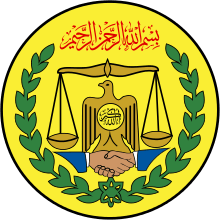Somaliland parliamentary election, 2005
 |
| This article is part of a series on the politics and government of Somaliland |
|
Constitution |
|
|
Judiciary |
|
|
|
Other |
|
|
Somaliland held elections to an 82-member House of Representatives on 29 September 2005. It was the first multiparty parliamentary election conducted in the secessionist Republic of Somaliland since 1991, when the Somali Civil War began.
Political parties
The Somaliland Constitution limits the number of political parties to three, all of which will compete in the election. Various sources provide different translations of political party names. They are:
- Peace, Unity, and Development Party (Kulmiye Nabad, Midnimo iyo horumar, also known as Solidarity / The Gathering / Union and Development), The party chairman is Ahmed Mohamed Mohamud Silanyo who is the current President of Somaliland.
- For Justice and Development (Ururka Caddaalada iyo Daryeelka, also known as the Justice and Welfare Party). The party chairman is Faysal Ali Warabe
- For Unity, Democracy, and Independence (Ururka dimuqraadiga ummadda bahawday, also known as Allied People's Democratic Party / United Democratic People's Party / National Alliance Democratic Party / Pillar). The party chairman is Dahir Riyale Kahin
There are a total of 246 candidates, including 5 women contesting the election.
Electoral system
According to Somaliland's House of Representatives Election Law, every party that contests the election is required to submit a list of its candidates to the National Electoral Commission. The names of the candidates shall be set out in a sequential order, and shall relate to each region on the basis of the number of seats allocated to each region. The seats allocated to each electoral region shall be won by the parties on the basis of proportional representation system as reflected by the votes cast for each party in the region
| Seat allocation by region | ||
| Region | Number of seats (82) | |
| Awdal | 13 | |
| Wooqoyi Galbeed | 20 | |
| Saaxil | 10 | |
| Togdheer | 15 | |
| Sanaag | 12 | |
| Sool | 12 | |
Final results
| Parties | Votes | % | Seats |
|---|---|---|---|
| UDUB For Unity, Democracy, and Independence (Ururka dimuqraadiga ummadda bahawday) | 261,449 | 39.0 | 33 |
| KULMIYE Peace, Unity, and Development Party (KULMIYE Nabad, Midnimo iyo horumar) | 228,328 | 34.1 | 28 |
| UCID For Justice and Development (Ururka Caddaalada iyo Daryeelka) | 180,545 | 26.9 | 21 |
| Total | 680,322 | 100.0 | 82 |
| Invalid votes | 4,585 | ||
| Total votes cast | 674,907 | ||
| Source: IRI | |||
A team of 76 observers from Canada, Finland, Kenya, South Africa, the United Kingdom, the United States and Zimbabwe monitored the polls. They described that the elections were conducted in a peaceful condition and were generally free and fair, nonetheless, the vote had fallen short of meeting several international standards.
See also
External links
- Somaliland Electoral Commission
- Elections in Somaliland - African Elections Database
- Seattle P-I - "Ruling party wins Somaliland elections"
- Reuters - "Ruling party wins Somaliland parliamentary polls"